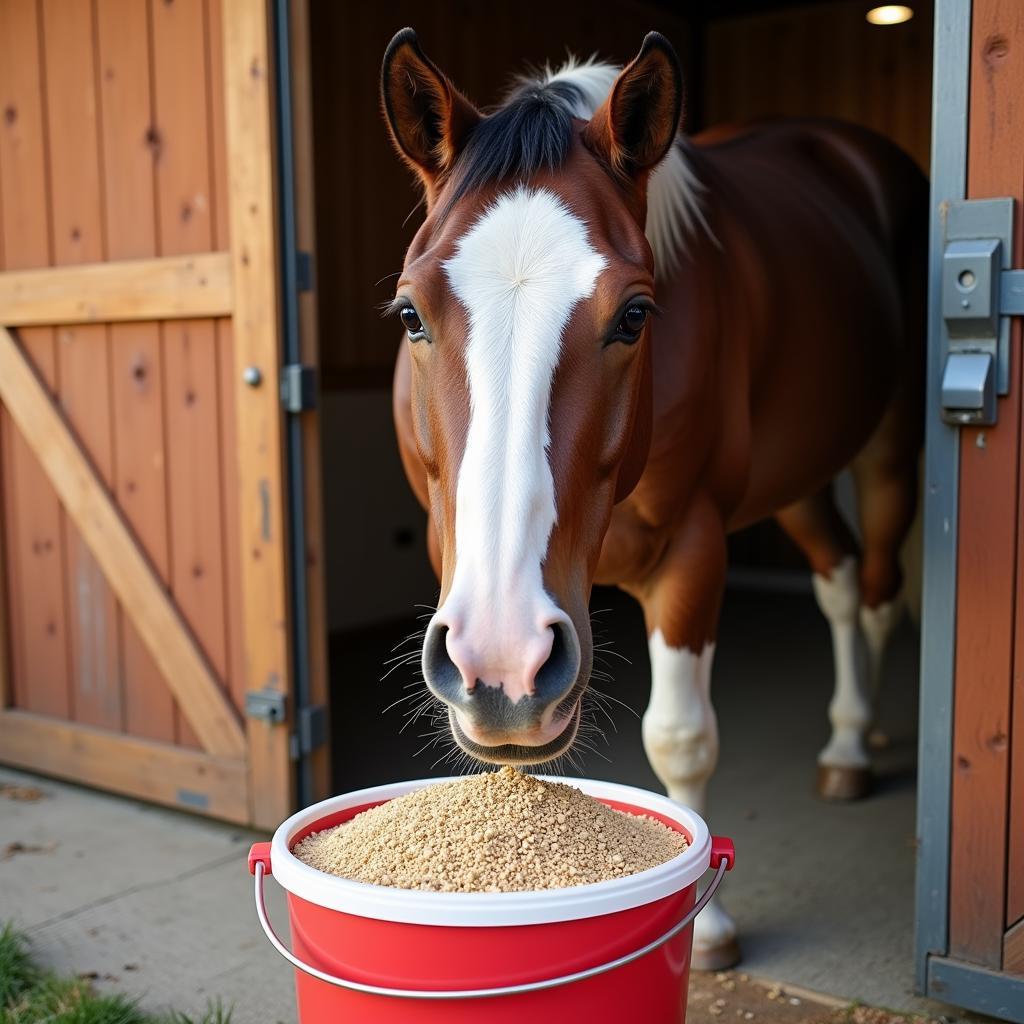Corn oil is a popular supplement for horses, often used to improve coat shine, add calories, and potentially reduce inflammation. But is corn oil always the best choice for your equine companion? This guide delves into the benefits, risks, and best practices for using corn oil for horses, providing horse owners with the information they need to make informed decisions.
The Benefits of Corn Oil for Horses
Corn oil, like other vegetable oils, is a source of energy. It’s particularly rich in omega-6 fatty acids, specifically linoleic acid, which plays a crucial role in maintaining healthy skin and coat. Adding corn oil to a horse’s diet can result in a noticeably glossier coat, a desirable trait for show horses and a general indicator of good health. It can also help horses gain or maintain weight, which is beneficial for hard keepers, those recovering from illness, or performance horses with high energy demands. Some horse owners also believe corn oil can help reduce inflammation, though more research is needed in this area. For horses prone to dry, dull coats, the addition of corn oil can be a noticeable improvement.
Potential Risks and Considerations of Corn Oil for Horses
While corn oil can offer several benefits, it’s important to be aware of the potential downsides. One concern is the imbalance of omega-6 to omega-3 fatty acids it can create. An excessive intake of omega-6s, without a corresponding increase in omega-3s, can potentially exacerbate inflammation rather than reduce it. This imbalance can also affect immune function and overall health. Another consideration is the caloric density of corn oil. Overfeeding can easily lead to weight gain, which can be detrimental to horses prone to obesity or those with metabolic issues. Always consult with a veterinarian or equine nutritionist before adding corn oil to your horse’s diet. They can help determine the appropriate amount based on your horse’s individual needs and health status.
How to Introduce Corn Oil to Your Horse’s Diet
Introducing corn oil slowly is key to avoiding digestive upset. Start with a small amount, gradually increasing the dosage over several days or weeks. This allows the horse’s digestive system to adapt to the added fat. The oil supplement for horses page on Justus Horses USA provides detailed information on various oil supplements for horses. It’s important to remember that each horse is different and what works for one may not work for another. Monitoring your horse’s response is crucial. Look for any signs of digestive upset, such as loose stools or colic. If any adverse reactions occur, discontinue use and consult your veterinarian.
Is Corn Oil Right for Your Horse?
Determining if corn oil is suitable for your horse depends on several factors. These include their current health status, dietary needs, and any existing conditions. For example, a horse with a dull coat and difficulty maintaining weight could benefit from corn oil supplementation. However, a horse prone to obesity or metabolic issues might be better suited to a different type of supplement. Consult with a vet or equine nutritionist for guidance.
“It’s important to remember that every horse is an individual,” says Dr. Emily Carter, DVM, an equine nutrition specialist. “What works for one horse may not work for another, so a personalized approach is always best.”
Alternatives to Corn Oil
If corn oil isn’t suitable for your horse, several alternatives exist. Flaxseed oil, rich in omega-3 fatty acids, can be a good option for balancing the omega-6s in corn oil. Rice bran oil is another alternative known for its high palatability. You can learn more about using horse cinnamon in your horse’s diet, which can be a beneficial addition in some cases.
 Horse Eating Supplemented Feed
Horse Eating Supplemented Feed
Conclusion
Corn oil can be a valuable addition to a horse’s diet, offering benefits for coat health and weight management. However, careful consideration of potential risks and proper introduction are crucial. By understanding the nuances of corn oil supplementation, horse owners can make informed decisions that support their horses’ overall well-being. Remember to always prioritize your horse’s individual needs and consult with a qualified professional for personalized advice. Justus Horses USA is committed to providing horse owners with accurate and up-to-date information. You can also explore other feeding options such as oats feed for horses and the use of a horse dandy brush for grooming on our website.
FAQ
- What are the signs of corn oil overdose in horses?
- Can I mix corn oil with other supplements?
- How much corn oil should I give my miniature horse?
- Does corn oil help with joint pain in horses?
- Can corn oil cause diarrhea in horses?
- What is the shelf life of corn oil?
- Where can I buy high-quality corn oil for my horse?
For support, contact us at Phone Number: 0772127271, Email: [email protected] Or visit us at: QGM2+WX2, Vị Trung, Vị Thuỷ, Hậu Giang, Vietnam. We have a 24/7 customer service team.